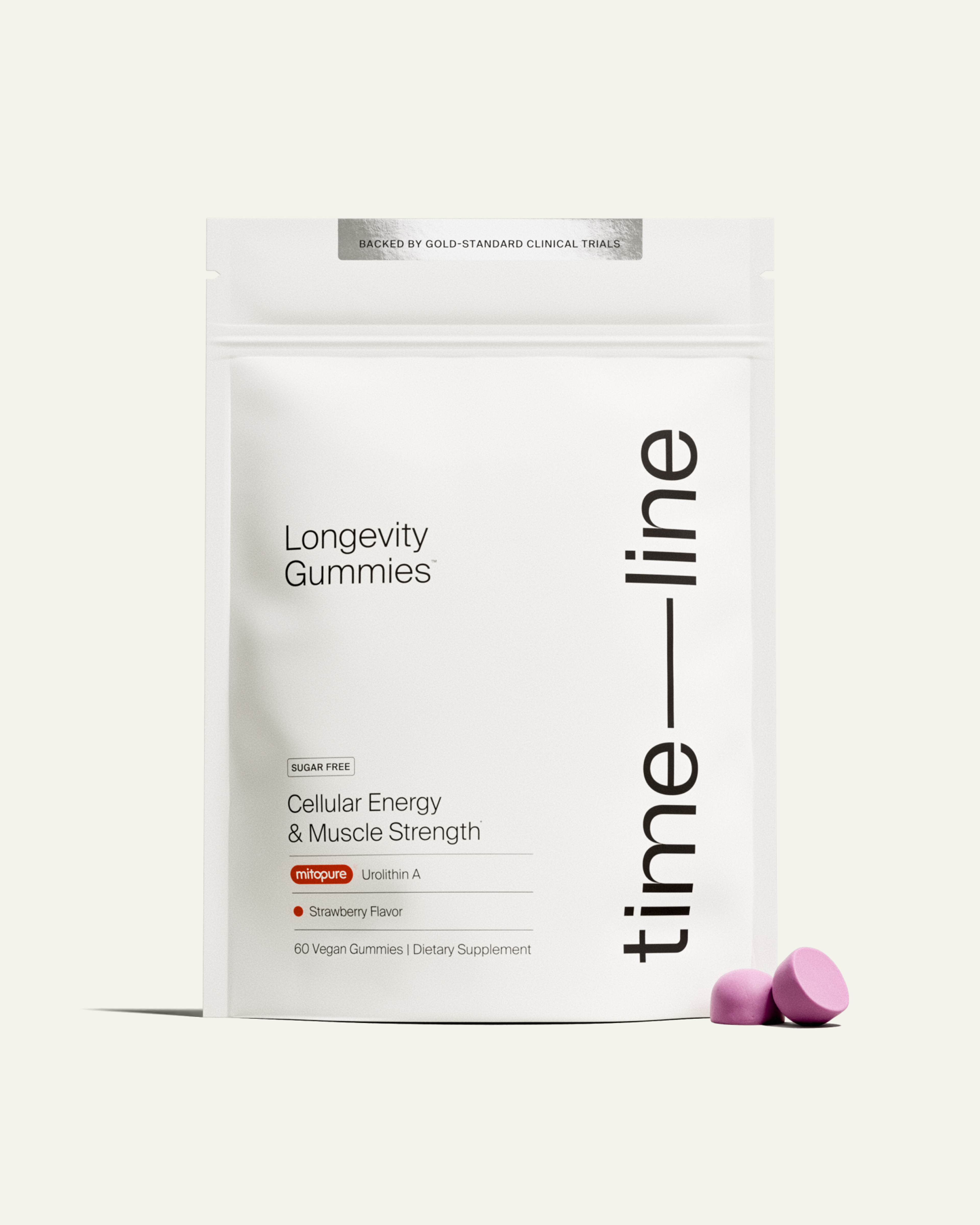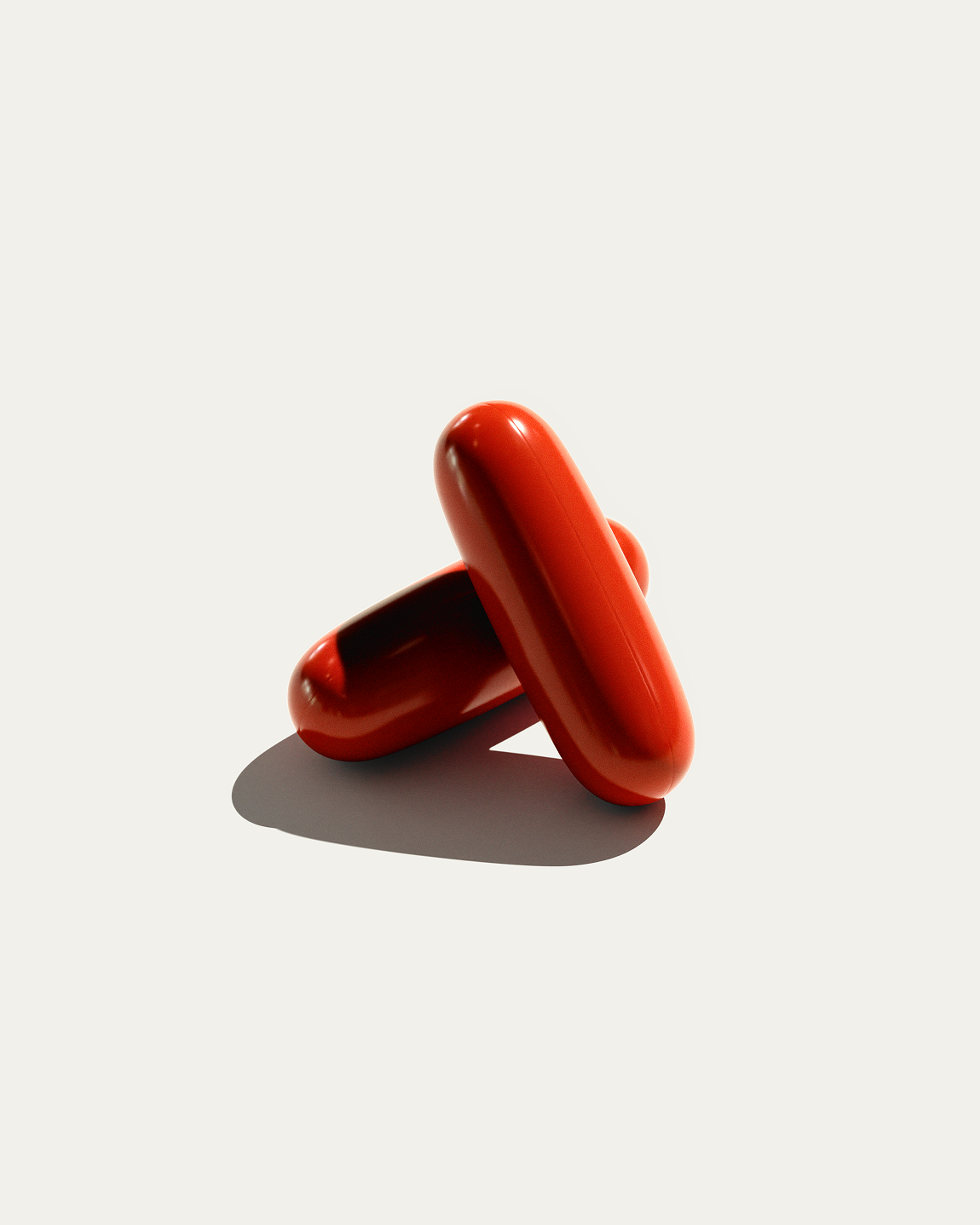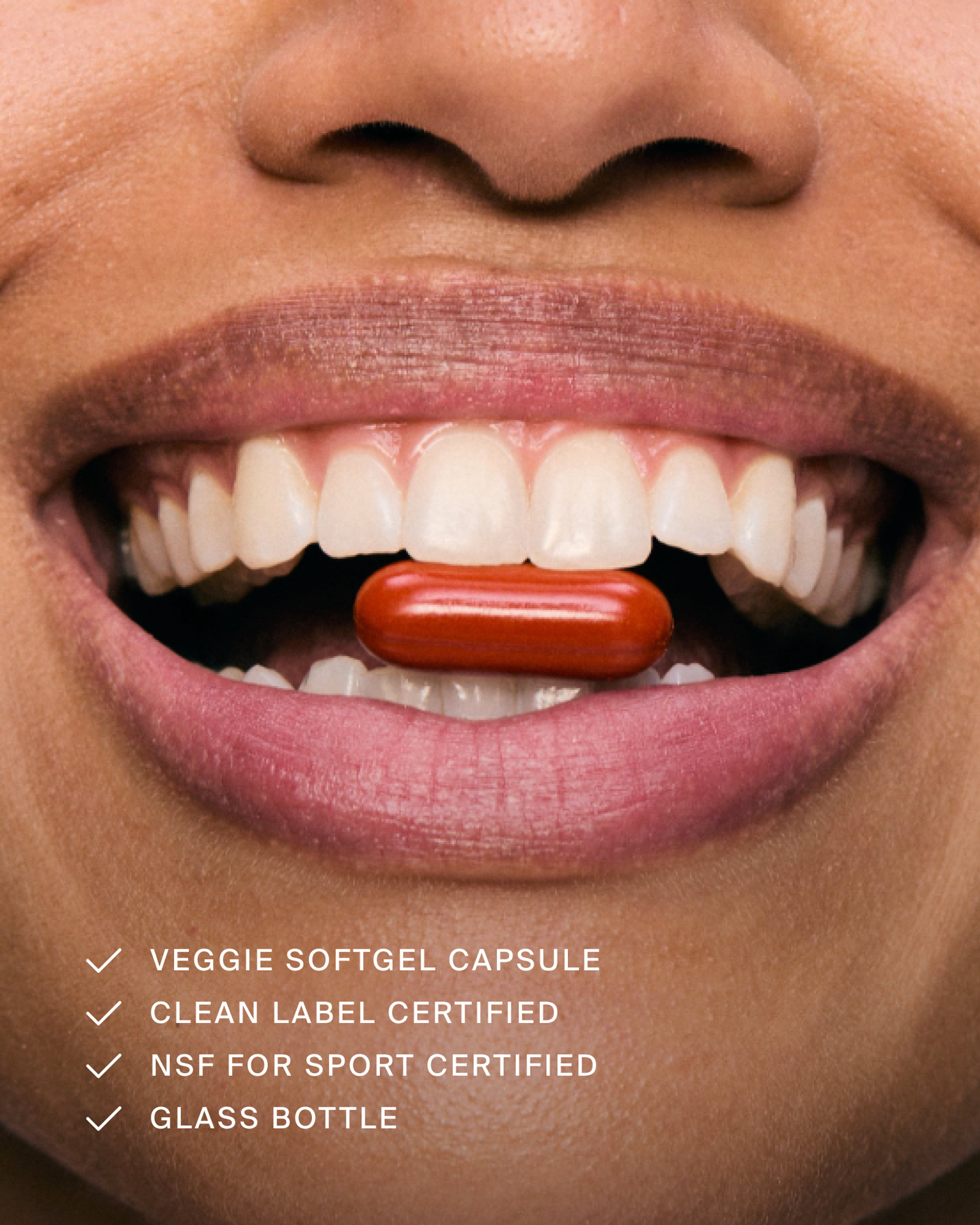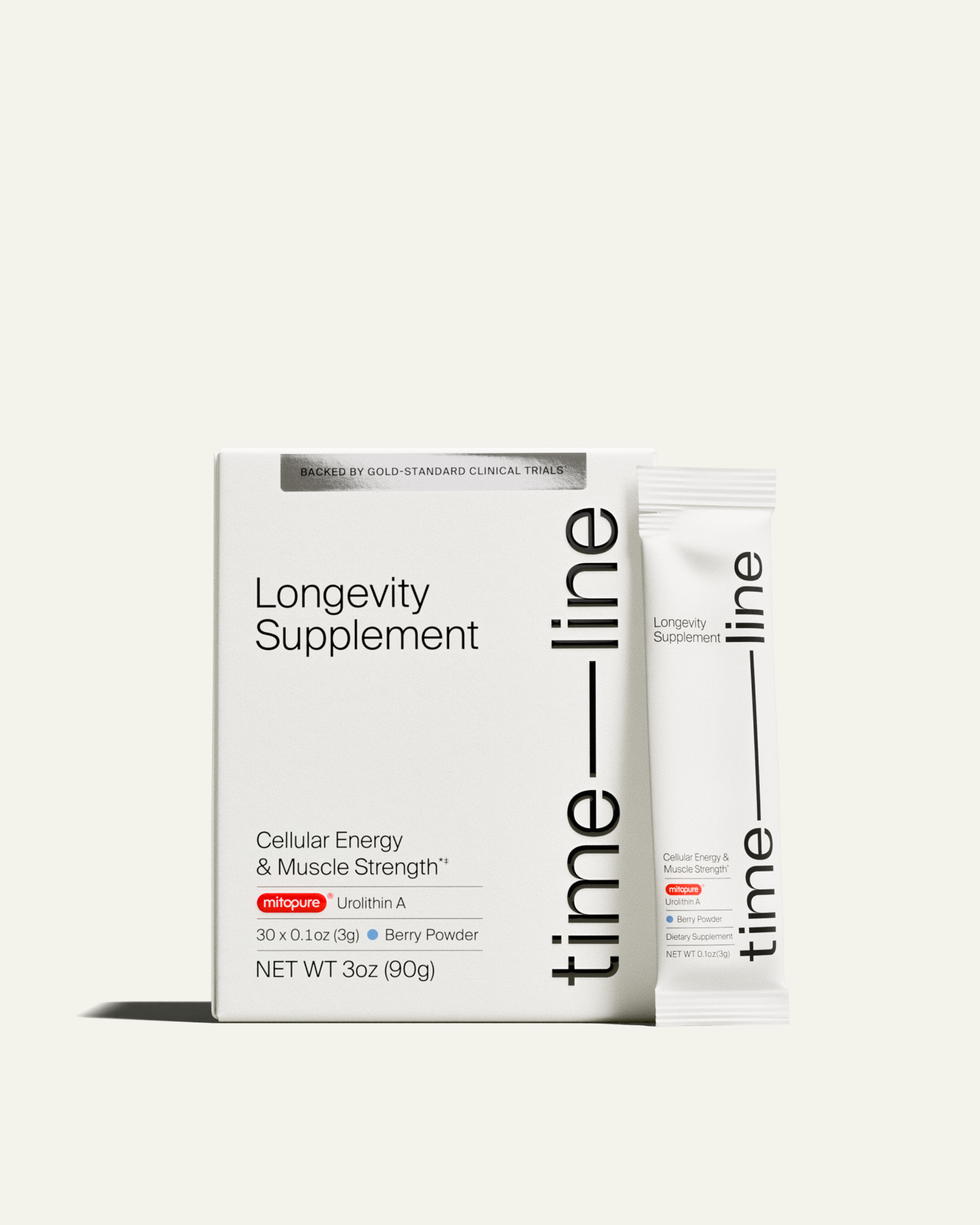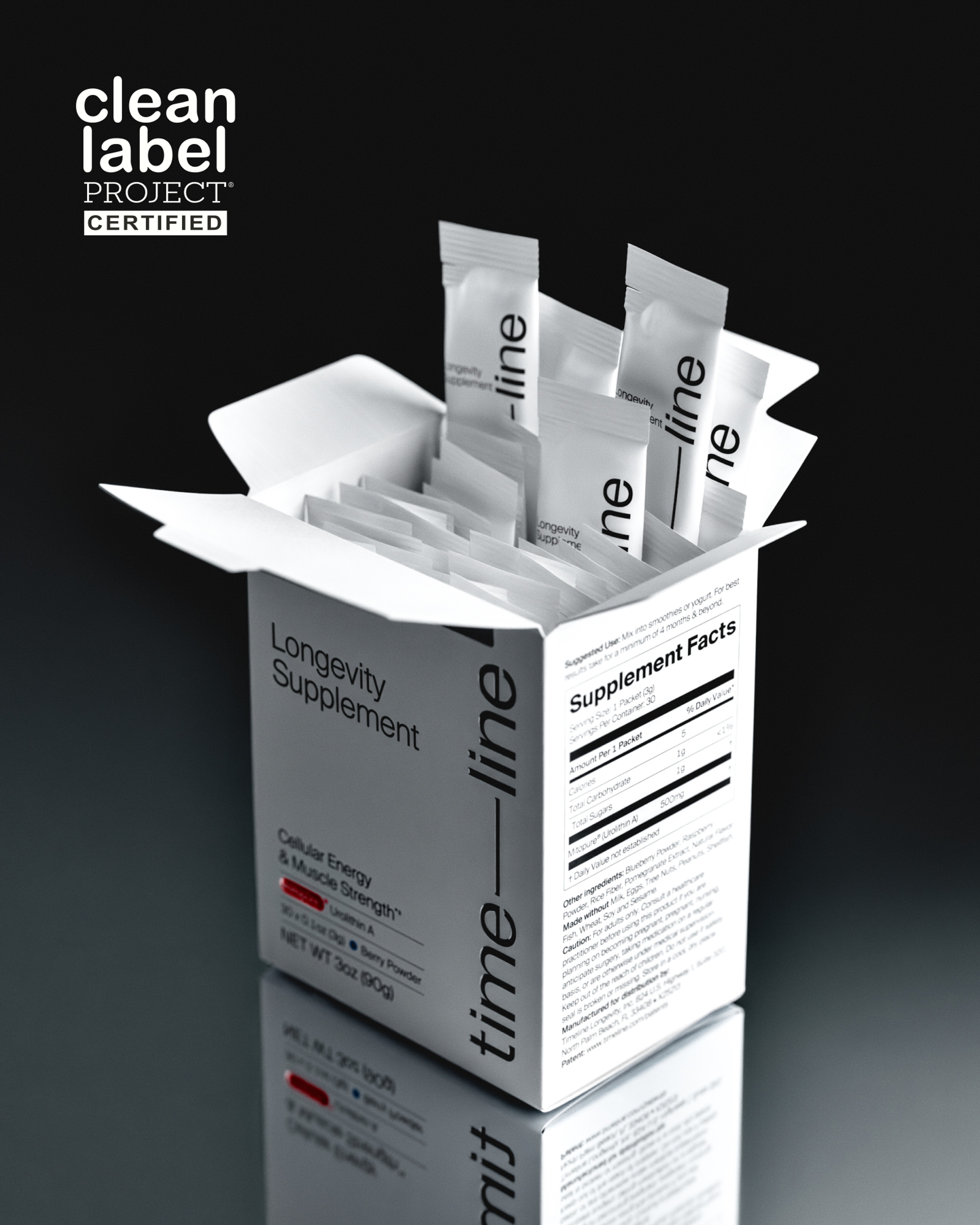Does CoQ10 really give you energy?
Want to know if the energy-boosting claims surrounding CoQ10 are really true? We explain how CoQ10 stacks up with other energy-enhancing nutrients.

Let’s face it. In today’s busy world, we could all use a little more energy to get through the day. The allure of a supplement to boost our energy may be enticing, but do they really work? The truth is that there has been an explosion of energy-enhancing products hitting the market of late. From energy drinks to supplements, one thing is clear: we are tired of feeling tired.
Over the past few years, much research has been dedicated to looking at many of these nutrients. While some are unlikely to deliver what they promise, others tell a compelling story. Coenzyme Q10 (CoQ10) is one of these molecules that shows promise in increasing energy, and it may also offer several interesting health benefits as well.
You may be wondering how CoQ10’s energy boost compares to other energy boosters, including Urolithin A (UA). While the use of CoQ10 appears promising, we believe that the foundation of cellular energy support begins with revitalizing the energy-producing powerhouse, the mitochondria. Read on to learn why.
What is CoQ10?
CoQ101[1] is a nutrient that plays a crucial role in how the body produces energy. This molecule lives inside your mitochondria, where it does two important things. First, it is involved in the electron transport chain, where the body’s energy-carrying molecule adenosine triphosphate (ATP) is produced. Secondly, it serves as an antioxidant, helping to protect the cell from oxidative stress. This is especially important to the mitochondria, whose delicate DNA is continually exposed to free radical damage as a byproduct of energy metabolism[2].
CoQ10 is also called “ubiquinone.” Interestingly this name refers to the ubiquitous nature of this compound and its presence in most cells of living beings. Every ATP-producing cell needs CoQ10, but the demands are heightened in tissues that require high energy levels, such as muscles, heart, kidney, and brain.[3]
Our bodies can make CoQ10; however, our capacity to do so declines with age. Combine this with high-stress lifestyles and living with chronic disease, and the body’s demand for this molecule increases markedly[4].
In comparison, Urolithin A is not directly made by the human body. Instead, our gut microbiome converts precursor molecules found in pomegranates, nuts, and berries into UA. Unfortunately, most of us can’t rely on this process, as only 1 in 3 people have the right microbiome balance to make adequate amounts. As we age, our ability to regenerate new mitochondria declines driving the need for higher levels of UA to support mitophagy. Turning to supplements may be the best way to benefit from this powerful nutrient.
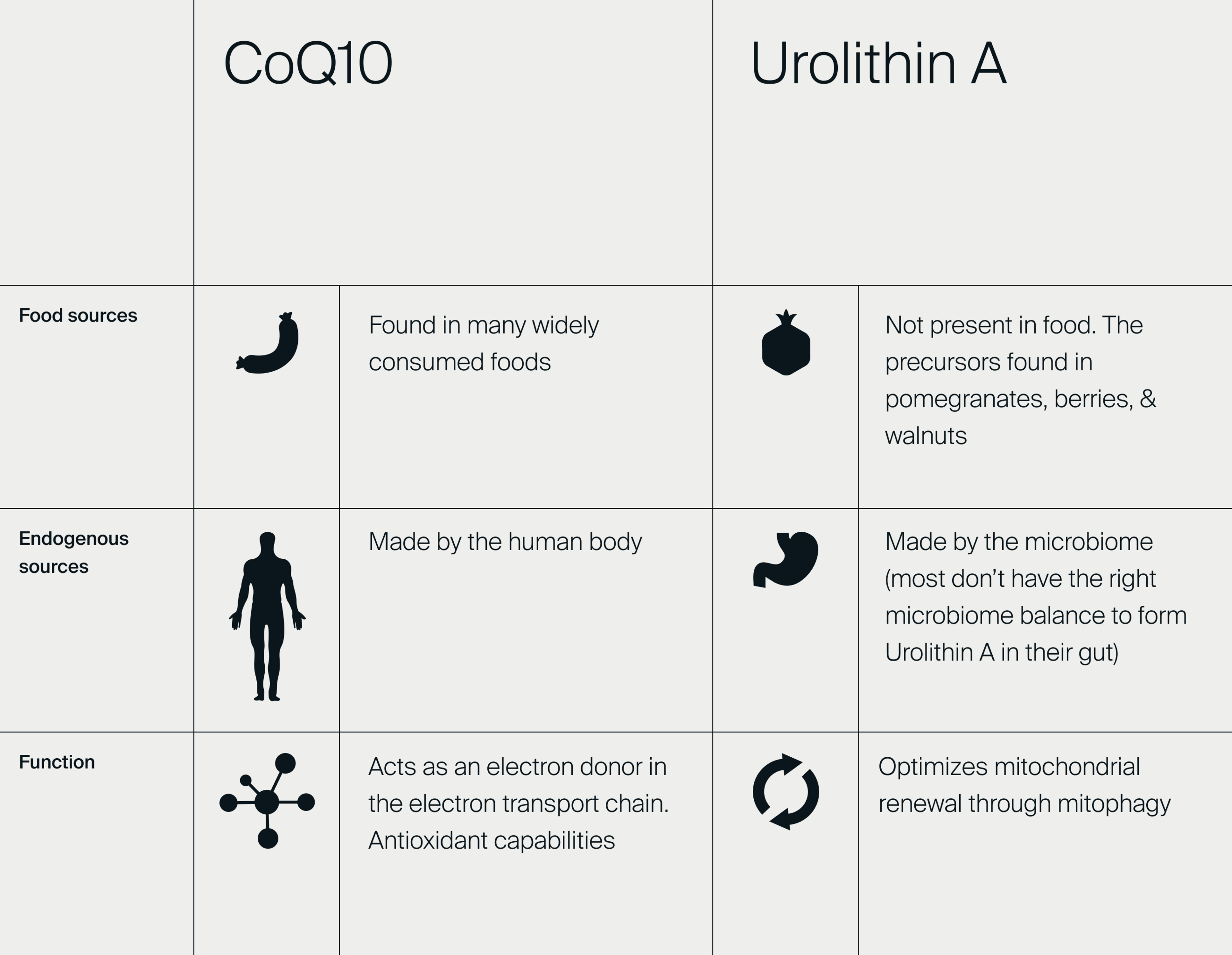
Comparison of the endogenous sources, food sources and the role in the body of Urolithin A and CoQ10
What foods contain the most CoQ10?
Luckily we don’t have to rely on our body's production capability alone to supply us with enough CoQ10. Many of the foods we commonly eat contain high amounts of CoQ10 and for most people, following a healthy diet will supply the body with adequate amounts.
Food sources of CoQ10 include[5]:
- Organ meat such as liver
- Fish including salmon, tuna, and herring
- Meat like beef, pork, lamb, and chicken
- Nuts and seeds such as peanuts, sesame seeds, pistachios, and walnuts
- Olive oil, corn oil, and soybean oil
A few fruits and vegetables are also good sources of CoQ10 and these include[6]:
- Avocado
- Black currant
- Cauliflower
- Garlic
- Spinach
- Sweet potato
There is no Recommended Dietary Allowance (RDA) for CoQ10 as there are other nutrients, but it has been suggested that consuming 3-5 mg a day is adequate.[7] However, studies indicate that higher intakes of CoQ10 may offer additional health benefits, especially in managing some types of chronic disease.[8]
CoQ10 supplements offer another way to supply the body with this critical nutrient, and a lot of research dollars have been spent on looking at the health benefits of supplementing the diet with CoQ10.
What are the health benefits of CoQ10?
Due to the important function CoQ10 plays in energy metabolism, antioxidant capability, and mitochondrial health, it’s no wonder this nutrient has been extensively investigated for many disease states and health-promoting powers. Many chronic conditions such as heart disease, diabetes, and neurological disease have been linked to low levels of CoQ10, driving the question — does supplementing with CoQ10 improve health outcomes? Here’s what the research says:

Person with a pacemaker
- Cardiovascular disease - perhaps one of the strongest cases for CoQ10 supplementation and chronic disease is its potential impact on heart disease. This well-researched area suggests that supplementation with CoQ10 may prevent cardiovascular disease even without lifestyle changes such as diet and exercise. It appears that CoQ10 benefits the heart in a number of ways. CoQ10 supplementation may lower diastolic blood pressure and improve lipid levels, and it seems especially helpful in treating chronic heart failure. This makes sense as low levels of CoQ10 are seen in the heart muscles of people living with heart failure.[9]
CoQ10 supplementation may offer another benefit to patients with heart disease. The widely used cholesterol-lowering class of drugs called statins is associated with lower levels of circulating CoQ10. Statins come with potential side effects, including statin-associated muscle symptoms, which may be ameliorated with CoQ10 supplementation.[10]
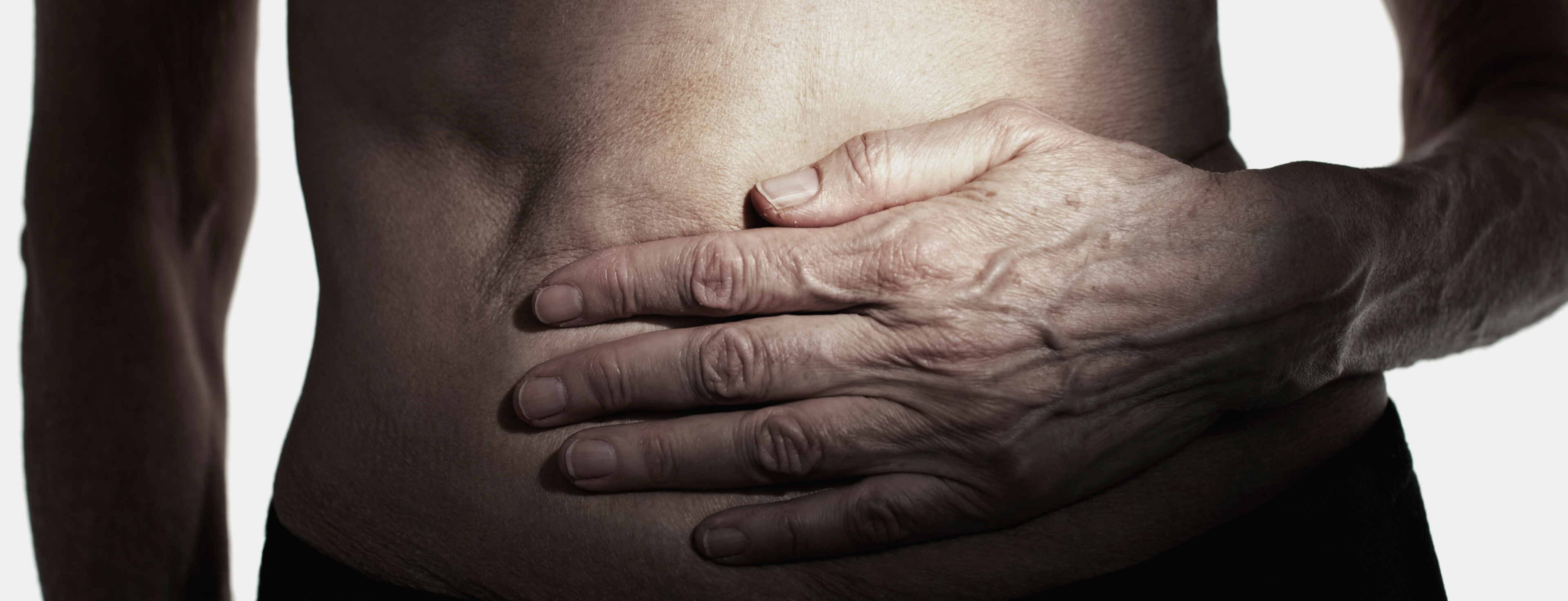
Diabetes
- Diabetes and metabolic syndrome - the research is not as conclusive here as with heart disease. Yet, it appears that CoQ10 may offer benefits to people with diabetes and metabolic syndrome due to its ability to act as an antioxidant. Research suggests that CoQ10 may help improve insulin sensitivity, lower serum insulin, and blood glucose levels, and improve other markers of metabolic syndrome.[11]
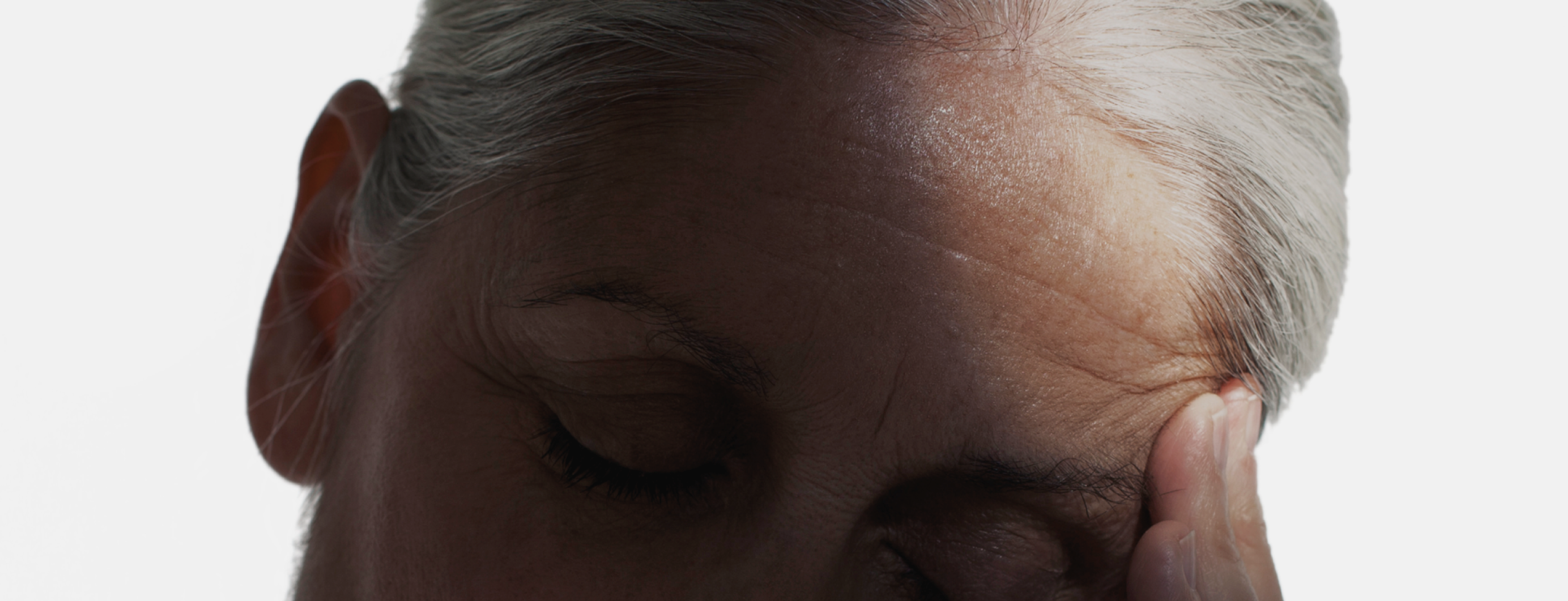
Alzheimer
- Neurodegenerative disease - Conditions involving the brain and nervous system have been associated with dysfunction of the mitochondria, so it is reasonable to think that targeted supplementation that supports mitochondrial health would benefit this class of disease. Clinical trials suggest that people with Parkinson's disease and Huntington's disease may see a delay in functional decline with CoQ10 supplementation. The use of CoQ10 in the treatment of Alzheimer's disease, chronic fatigue syndrome, autistic disorders, seizures, and even migraines is also being investigated.[12]
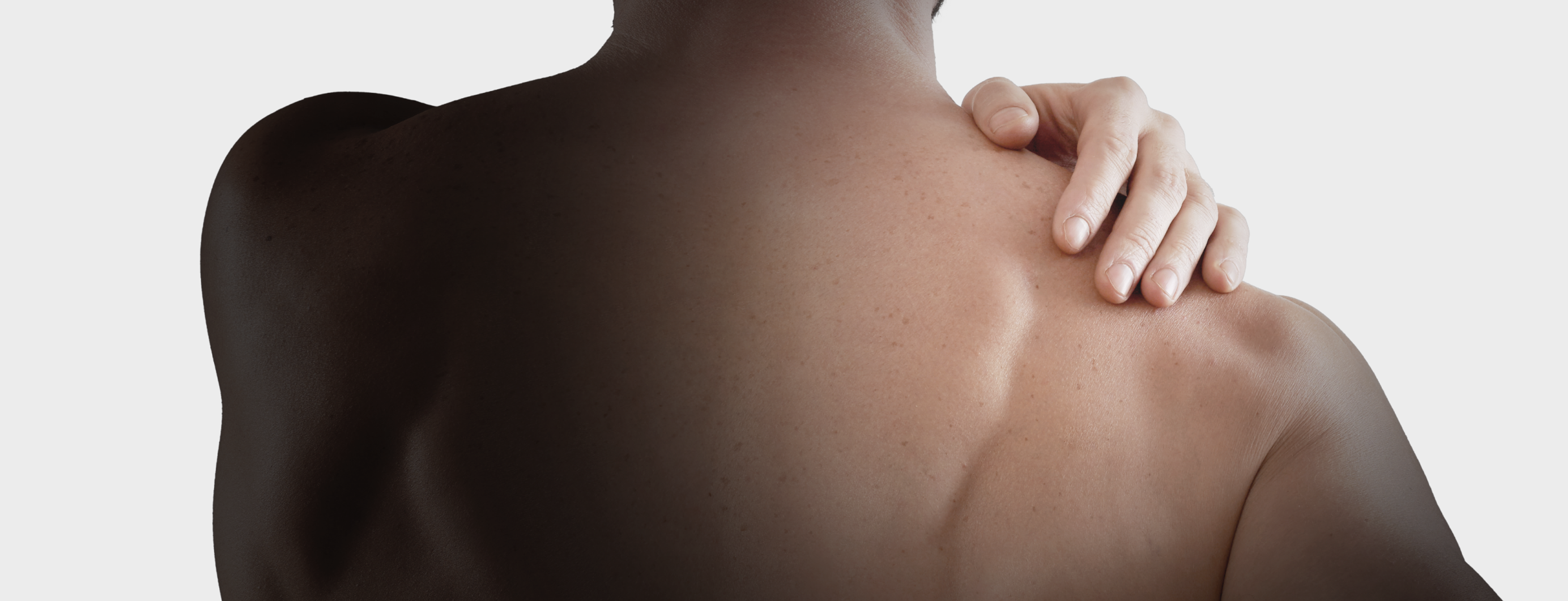
Muscle pain
- Athletic performance - due to its role in energy metabolism, athletes have turned to CoQ10 to boost their physical performance, and the research seems to support this trend. Studies have demonstrated improved performance metrics in professionally trained athletes and non-athletes alike with short-term supplementary with CoQ10.[13]
CoQ10 Energy Boost
One of CoQ10’s most important functions is to support energy production at a cellular level. Mitochondria are organelles that reside in most of our cells, and they act as tiny factories that manufacture energy from the food we eat and the air we breathe. Nutrients and cofactors, including CoQ10, serve as the workers, each having a unique role in driving the energy assembly line.
CoQ10 Cellular Energy Boost
CoQ10 acts as a cofactor in a series of reactions called the electron-transport chain. Here, it helps transfer electrons from molecule to molecule, helping to build up an electrochemical gradient whose energy is used to generate ATP. Without CoQ10, our mitochondria would not be able to produce ATP.
CoQ10 vs. other cellular energy boosters
While CoQ10 is a critical nutrient in driving energy production at the cellular level, it’s important to know that it is just one of many molecules in the complex process of energy creation. While it can be a support to driving ATP production, it misses the huge driver of mitochondrial health and energy production, that of mitophagy.
CoQ10 vs. Urolithin A
Urolithin A, like that found in our proprietary Mitopure, impacts cellular energy at the root by supporting mitophagy. Mitophagy is the process where defective mitochondria are recycled and renewed to improve their performance. While CoQ10 is a critical cofactor in ATP production and protects mitochondrial DNA from free-radical damage, it does not appear to support the creation of newer, healthier mitochondria. Mitochondria that can perform their job more efficiently may be the key to better energy.
Over 300 preclinical and clinical trials over the past ten years have explored UA’s potential benefits and safety. Urolithin A has been clinically proven to improve muscle function, strength, and endurance.[14] Additionally, it is being studied for treatment in a number of age-related conditions including[15]:
- Cardiovascular disease
- Neurodegenerative disease
- Diabetes
- Joint disease
Mitopure offers tangible improvements when it comes to boosting energy. Apollo, one of our customers, raves:
In terms of the impact on my energy levels, this is the most powerful supplement I've ever tried. My "afternoon slump" was gone immediately after starting a daily dose, and I've had pretty good energy levels every day since.Apollo
Many of our other customers agree. “Timeline is a fabulous product, and I feel more energy and muscle tone since taking it. It's on my "forever list" of supplements for me.” says Lori.
Unlike CoQ10, Urolithin A is not readily available in the diet. Specific polyphenolic compounds in pomegranates, walnuts, and berries are converted to UA by our gut microbiome, however, only about ⅓ of the population is able to do this. Plus, the fact that most of us don’t consume pomegranates on a regular basis, getting enough UA without a supplement is difficult for most.
Mitopure is available in several easy-to-take forms, including soft gels and powders.
CoQ10 vs. NAD+
The increasingly popular nicotinamide adenine dinucleotide (NAD) energy-boosting supplement has recently garnered use both in oral and IV supplementation forms. NAD+ is a coenzyme found in every cell in the body, and it is essential to mitochondrial function and energy metabolism. Ongoing research highlights the role this molecule plays in healthy aging and disease prevention.[16]
NAD+ acts in a similar fashion to CoQ10, transferring electrons from molecule to molecule to create an energy gradient and drive ATP production. Since both of these molecules are needed to drive the electron transport chain, they are sometimes used together to promote energy production. When used in tandem NAD+ and CoQ10 were able to improve fatigue associated with chronic fatigue syndrome.[17]
Supplementing with CoQ10
For those of us who eat a well-balanced diet, it’s not difficult to get adequate amounts of CoQ10 so a supplement may not offer additional benefits. However, if you are living with a chronic condition you may be interested in learning how additional CoQ10 can help. While many clinical trials examining CoQ10 safety and efficacy demonstrate that it is likely safe to use, it’s best to discuss this with your doctor to determine if it’s a good choice for you and your health.
It should be noted that CoQ10 is a fat-soluble nutrient, so taking it with food is best to help you absorb it. Like Urolithin A, CoQ10 is not a stimulant like caffeine. It boosts energy on the cellular level, so the effects are not immediate.
These two molecules optimize energy on the cellular level, and their impact will build over time with consistent intake.
Our verdict
CoQ10 appears to offer some benefits in managing chronic conditions, improving athletic performance and may help you feel more energized in your day-to-day tasks. However, to truly address energy metabolism at its core, supporting your mitochondria with a product like Mitopure, may be your best bet.
Authors

Written by
Director Science Communications
References
- ↑
Hernández-Camacho JD, Bernier M, López-Lluch G, Navas P. Coenzyme Q10 Supplementation in Aging and Disease. Frontiers in Physiology. 2018;9. Accessed April 2, 2022. https://www.frontiersin.org/article/10.3389/fphys.2018.00044
- ↑
Aaseth J, Alexander J, Alehagen U. Coenzyme Q10 supplementation - In ageing and disease. Mech Ageing Dev. 2021;197:111521. doi:10.1016/j.mad.2021.111521
Barcelos IP de, Haas RH. CoQ10 and Aging. Biology. 2019;8(2):28. doi:10.3390/biology8020028
- ↑
Saini R. Coenzyme Q10: The essential nutrient. J Pharm Bioallied Sci. 2011;3(3):466-467. doi:10.4103/0975-7406.84471
- ↑
Shukla S, Dubey KK. CoQ10 a super-vitamin: review on application and biosynthesis. 3 Biotech. 2018;8(5):249. doi:10.1007/s13205-018-1271-6
- ↑
Barcelos IP de, Haas RH. CoQ10 and Aging. Biology. 2019;8(2):28. doi:10.3390/biology8020028
Pravst I, Žmitek K, Žmitek J. Coenzyme Q10 Contents in Foods and Fortification Strategies. Critical Reviews in Food Science and Nutrition. 2010;50(4):269-280. doi:10.1080/10408390902773037
- ↑
Pravst I, Žmitek K, Žmitek J. Coenzyme Q10 Contents in Foods and Fortification Strategies. Critical Reviews in Food Science and Nutrition. 2010;50(4):269-280. doi:10.1080/10408390902773037
- ↑
Barcelos IP de, Haas RH. CoQ10 and Aging. Biology. 2019;8(2):28. doi:10.3390/biology8020028
- ↑
Garrido-Maraver J, Cordero MD, Oropesa-Ávila M, et al. Coenzyme Q10 Therapy. Mol Syndromol. 2014;5(3-4):187-197. doi:10.1159/000360101
- ↑
Ayers J, Cook J, Koenig RA, Sisson EM, Dixon DL. Recent Developments in the Role of Coenzyme Q10 for Coronary Heart Disease: a Systematic Review. Curr Atheroscler Rep. 2018;20(6):29. doi:10.1007/s11883-018-0730-1
- ↑
Qu H, Meng Y yan, Chai H, et al. The effect of statin treatment on circulating coenzyme Q10 concentrations: an updated meta-analysis of randomized controlled trials. Eur J Med Res. 2018;23(1):57. doi:10.1186/s40001-018-0353-6
- ↑
Amin MM, Asaad GF, Abdel Salam RM, El-Abhar HS, Arbid MS. Novel CoQ10 antidiabetic mechanisms underlie its positive effect: modulation of insulin and adiponectine receptors, Tyrosine kinase, PI3K, glucose transporters, sRAGE and visfatin in insulin resistant/diabetic rats. PLoS One. 2014;9(2):e89169. doi:10.1371/journal.pone.0089169
- ↑
Testai L, Martelli A, Flori L, Cicero AFG, Colletti A. Coenzyme Q10: Clinical Applications beyond Cardiovascular Diseases. Nutrients. 2021;13(5):1697. doi:10.3390/nu13051697
- ↑
Alf D, Schmidt ME, Siebrecht SC. Ubiquinol supplementation enhances peak power production in trained athletes: a double-blind, placebo controlled study. J Int Soc Sports Nutr. 2013;10:24. doi:10.1186/1550-2783-10-24
Gökbel H, Gül I, Belviranl M, Okudan N. The Effects Of Coenzyme Q10 Supplementation on Performance During Repeated Bouts of Supramaximal Exercise in Sedentary Men. The Journal of Strength & Conditioning Research. 2010;24(1):97-102. doi:10.1519/JSC.0b013e3181a61a50
- ↑
Effect of Urolithin A Supplementation on Muscle Endurance and Mitochondrial Health in Older Adults: A Randomized Clinical Trial | Geriatrics | JAMA Network Open | JAMA Network. Accessed February 3, 2022. https://jamanetwork.com/journals/jamanetworkopen/fullarticle/2788244?utm_source=twitter&utm_medium=social_jamajno&utm_term=6220908704&utm_campaign=article_alert&linkId=148883675
- ↑
D’Amico D, Andreux PA, Valdés P, Singh A, Rinsch C, Auwerx J. Impact of the Natural Compound Urolithin A on Health, Disease, and Aging. Trends in Molecular Medicine. 2021;27(7):687-699. doi:10.1016/j.molmed.2021.04.009
- ↑
Cantó C, Menzies KJ, Auwerx J. NAD+ Metabolism and the Control of Energy Homeostasis: A Balancing Act between Mitochondria and the Nucleus. Cell Metabolism. 2015;22(1):31-53. doi:10.1016/j.cmet.2015.05.023
- ↑
Castro-Marrero J, Sáez-Francàs N, Segundo MJ, et al. Effect of coenzyme Q10 plus nicotinamide adenine dinucleotide supplementation on maximum heart rate after exercise testing in chronic fatigue syndrome - A randomized, controlled, double-blind trial. Clin Nutr. 2016;35(4):826-834. doi:10.1016/j.clnu.2015.07.010
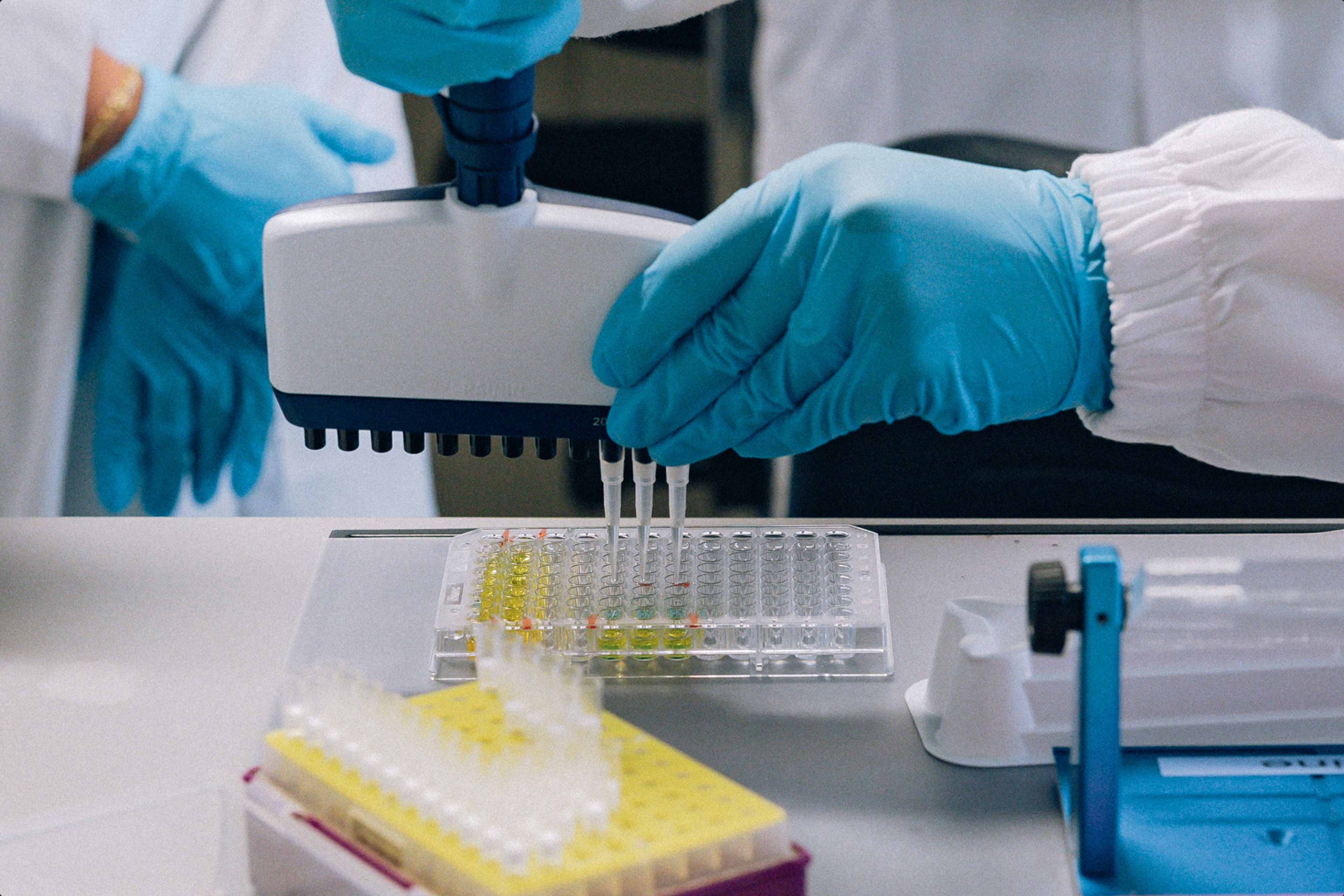
·
Nutrition·
Studies·
